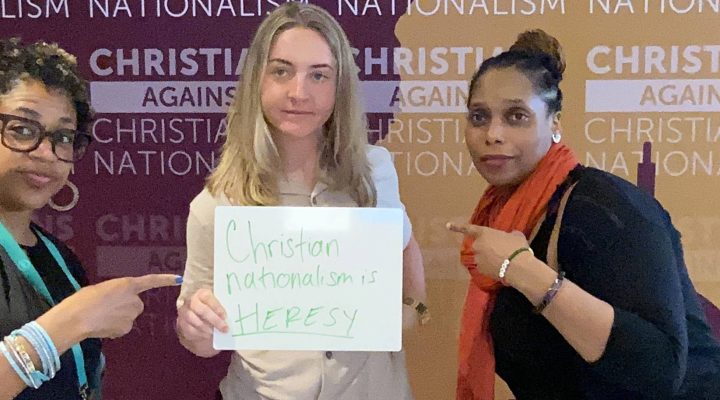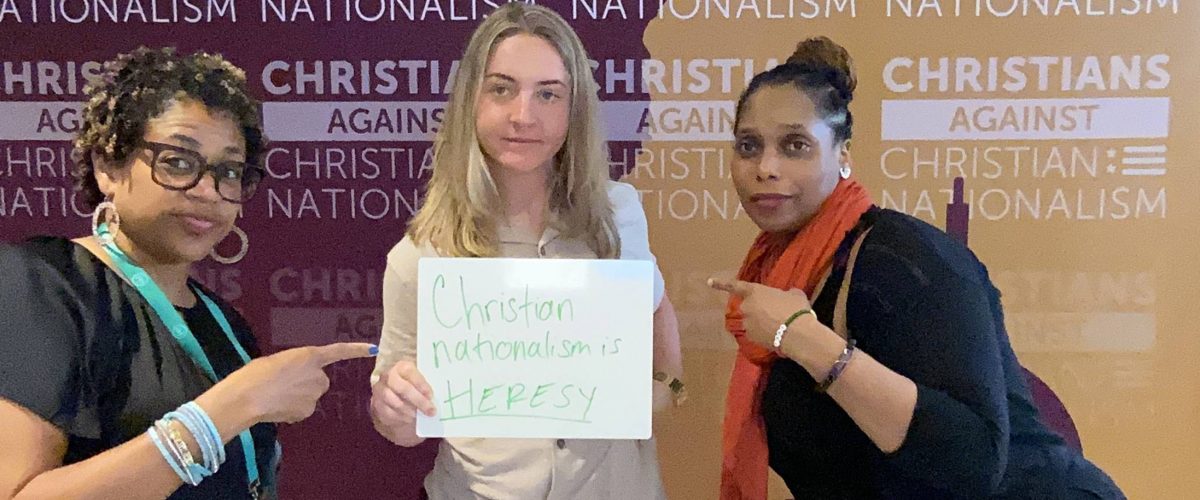Patriarchy, gender inequality and white Christian nationalism present a threat to individuals, churches and culture that must be countered, a panel of female Baptist leaders said during the Cooperative Baptist Fellowship General Assembly in Greensboro, N.C., June 21.
Panelists Anyra Cano, director of programs and outreach for Fellowship Southwest; Carol McEntyre, senior minister of First Baptist Church in Greenville, S.C.; Meredith Stone, executive director of Baptist Women in Ministry; and Amanda Tyler, executive director of BJC, the Baptist Joint Committee for Religious Liberty, responded to prompts from Andy Hale, host of “CBF Connections,” the Fellowship’s podcast.
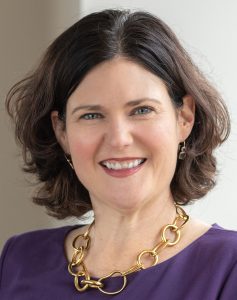
Amanda Tyler
“White Christian nationalism … is this merger of Christian and American identities into one,” Tyler explained. “It’s the suggestion that to be a good or true American, one has to be a Christian and not just any kind of Christian, but a Christian who holds certain fundamentalist religious beliefs that are often in line with certain conservative political priorities.”
“White” is an important part of the phrase because “Christian nationalism often provides cover for white supremacy,” she said. “White supremacy is baked into the idea of Christian nationalism. And that gets to one of these markers of Christian nationalism, which is a heavy reliance on this mythology of the founding of America as a ‘Christian nation.’”
“Gender inequality reflects any way in which a person other than a … male experiences things that are not the same as males experience,” Stone added, citing pay inequality and ongoing biases. “It’s the things that we actually are experiencing every day — that’s gender inequality.”
“Patriarchy is the belief that one group can rule over another group,” McEntyre said, adding patriarchy and Christian nationalism “both have oppression at their core.”
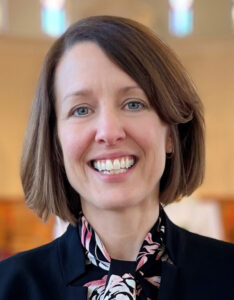
Carol McEntyre
Patriarchy is the ideology that says gender inequality is “how it’s supposed to be,” Stone said. “Ideology is the stronghold that says these are people who should be in power, and it tries to convince everybody else as well as the people in power that’s right.”
“I really appreciated how Meredith’s definition of patriarchy pulls out the idea of ideology and power, because that is also at the heart of white Christian nationalism,” Tyler said. “Baked into what it’s meant to be a Southern Baptist for all of time has been Christian nationalism — a decision made to depart from the teachings of Jesus in service of power.”
The panel discussion occurred a week after the Southern Baptist Convention held its annual meeting. While a constitutional amendment that would have disfellowshipped churches that install any woman in a position that uses the term “pastor” failed to get the required two-thirds majority, it received 61% of the vote. Also, the SBC leaned on its faith statement, which says women should not be pastors or elders, to remove First Baptist Church in Arlington, Va., for hiring a female to be its pastor to children and women.
“The fruits of that decision” were made almost 180 years ago, (when the SBC was founded in defense of holding people as slaves), Tyler noted. “I don’t think we can be too surprised that patriarchy has been part of it from the beginning and we’re seeing those fruits come to bear.”
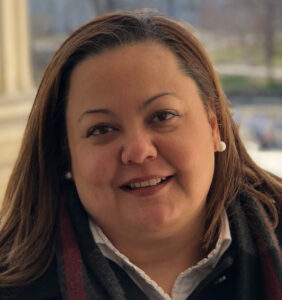
Anyra Cano
As a Latina whose parents came to the United States from another country, Cano pointed to the layers of subjugation inherent in patriarchy and Christian nationalism.
“When we talk about white Christian theology or ideology, or when we talk about the ‘Make America Great Again’ ideology, we’re talking about when women didn’t have rights and when women of color had much fewer rights,” she explained.
Hale asked the panelists to “hold the mirror up to ourselves” and talk about microaggressions against women that exist in CBF-affiliated churches.
Microaggressions surfaced in BWIM’s 2021 “State of Women in Baptist Life” report, Stone noted. “We asked women about the obstacles they were encountering because of their gender, and the one that scored the highest was that women felt they had to work harder to prove their competence than their male counterparts.”
Microaggression exists in statements claiming female preachers are better than male preachers, she said. “They think it’s a compliment, but what they’re saying is women pastors have to be so much better than male pastors. We all should have that freedom to preach.”
“We need to believe women when they say there are microaggressions happening against them,” McEntyre added. She described situations in which her gender has come into consideration when others evaluate church dynamics.
“I appreciate people being sensitive about it, but it’s just one more reminder that you’re not equal,” she said. “You know you’re not seeing us as equal when we’re called ‘female pastors’; we’re not called ‘pastors.’ That constant reminder that you’re not normative is a microaggression in itself.”
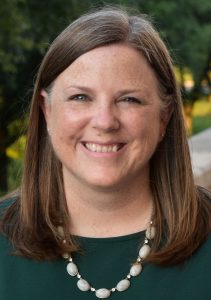
Meredith Stone
One of the microaggressions against female ministers of color happens when they are overlooked by others, Cano explained.
“I don’t know how many times I’ve been overlooked for being a Latina woman in ministry,” she said. As an example, she described when she was executive director of BWIM of Texas, and Stone had become executive director of the national organization. Two white women at a CBF meeting insisted on speaking with Stone when Cano could have helped them.
“It was very apparent to me that it wasn’t that they wanted to speak to Meredith because she was the backbone of ministry,” she recalled. “It was very apparent to me that they didn’t want to speak to me because I was not white.”
Tyler thanked Cano for raising the issue of race in relation to the judgmental mindsets.
“The Southern Baptist Convention can be a convenient punching bag,” she said. “And there can be a tendency in more moderate and progressive Baptist circles of having some Baptist exceptionalism — kind of like American exceptionalism. We’ve all said, ‘I’m not that kind of Baptist’ at some point. But for Baptists who are living in the South, for white Baptists in particular who are living in the South, we are that kind of Baptist, because we came out of the Southern Baptist Convention, and those are our roots.
“So, that’s part of what we’re trying to do with Christians Against Christian Nationalism is to ask all Christians and specifically all white Christians to understand how we have internalized and accepted these narratives of Christian nationalism through centuries of this going on. If we don’t do that, if we don’t do our own work, then we are not going to be successful in dismantling Christian nationalism and dismantling the patriarchy.”
Stone recounted a screening of BWIM’s new documentary, Midwives of a Movement. Someone asked Nancy Hastings Sehested — “the prophet, the visionary, the mother who imagined our movement”— why the founders of the movement to support Baptist female ministers did not include Black women.
“We were the fruit of a poisoned tree.”
“Nancy, in her wisdom, apologized,” Stone reported. “And then she said, ‘But here is the situation: We were the fruit of a poisoned tree.’ And until we can acknowledge the roots of that poisoned tree that have led us into this space, we’re not going to be able to deal with it.”
Hale asked panelists to consider how people’s age factors into acceptance of Christian nationalism.
“If you look at the public polling around how people are embracing or rejecting Christian nationalism, there is a generational divide; the younger people tend to embrace it at lower levels,” Tyler reported. But not only is it an ideology and cultural framework, but also “a very well-funded political movement.”
As an ideology, Christian nationalism “ebbs and flows,” she said. “There are certain areas of the country that have higher instances than others or certain demographics, including age, that have higher instances than others. But … this well-funded political movement is trying to exploit (Christian nationalism) in order to hold on to their power, because they feel their power is slipping away.
“There’s actually a concerted effort to push the teaching of Christian nationalism in public schools so that our youngest neighbors in America are being indoctrinated into white Christian nationalism,” she continued. “We have to be very alert to this particular threat and stand against it. If not, then we will have more future generations who are embracing Christian nationalism at a high level.”
McEntyre noted Louisiana’s state government recently mandated posting the Ten Commandments in every public-school classroom. Texas tried to pass a similar law, and more states will attempt it “because the U.S. Supreme Court has been chipping away at the wall separating church and state,” Tyler added, warning, “Watch out, because I bet in your state legislature, you are about to have a bill filed next session about posting the Ten Commandments in your schools, too.”
Hale cited “studies of why people are leaving congregations” and asked panelists to talk about how “Cooperative Baptists have the opportunity to tell a counter-narrative of what it means to be Baptist, what it means to be the church” in ways that oppose patriarchy, gender inequality and white Christian nationalism.
McEntyre said that is why she chose to participate in an interview about the SBC’s Law Amendment on a local TV station. “I did that because I wanted to put that voice out there — an alternative Christian narrative,” she explained. “I do think we have to be lifting up a different way to be Baptist, to be Christian, because we all know … the side that is more linked closely to politics is the one that’s getting all the media attention.”
“We actually only want the tent to be large enough to always cover those who are on the more conservative side.”
Stone recalled a conversation in which someone observed the typical meaning of being a “big tent” organization is “we actually only want the tent to be large enough to always cover those who are on the more conservative side, and what ends up happening is women, people of global majority and LGBTQ people wind up being the tent poles holding the weight of the tent that will always be large enough to leave them out.”
“That image is seared in my mind, and what we’re trying to do at Baptist Women in Ministry is recenter that tent to say we want a tent that will always be big enough to cover those who have been marginalized,” she said. “We want … to always make sure that happens. But that means some people who have experienced the safety of the tent their whole lives might have to be willing to bear the weight for a little while.
“I hope we can do that, because if we can do that as the Cooperative Baptist Fellowship, we can model a very different way of existing in U.S. society that says we want to make sure all people are safe, and we can exist together in disagreement and still prioritize the safety and well-being of all persons.”
“When we’re doing our best at being Baptist, we are models for what a democratic culture and society can look like,” Tyler said. “We are also fully committed to all kinds of freedom — soul freedom, Bible freedom, church freedom and religious freedom.
“When I’m thinking about providing that model or that witness to the broader culture, … when I think about how the Bible is being weaponized and used to limit freedom right now, I think Baptists can provide a really important counterweight to the idea that the state takes one person’s theological view or one person’s interpretation of the Bible and tries to impose it on everyone else.
“Whether it be in service of restrictive abortion bans or policies against transgender people. Whether it be in all kinds of places of oppression and inequality — we can say: ‘No, you are taking one interpretation of the Bible and imposing it on everyone else. Leave that to religious institutions.’ In a free society, we have a place where all people have a chance to live a flourishing life, and we value equality over this kind of restrictive reading of the Bible that excludes people.”
Related articles:
Now Beth Moore is taking on patriarchy in the church
The church faces a three-dimensional decision I Analysis by Mark Wingfield
Why aren’t we talking about the theology that drives white Christian nationalism? I Analysis by Rick Pidcock
‘Christian nationalism is more than attitudes; it’s a political dysfunction’
White Christian nationalism in a tailored suit I Opinion by Robert P. Jones

